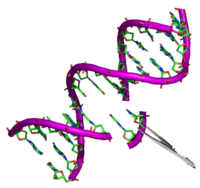
Photo from wikipedia
Abstract Generation of an herbicide-tolerant cultivar could be an important goal in rice breeding program. Therefore, a direct mutagenesis approach (megaprimer technique) was employed to generate the EPSPS (5-enolpyruvylshikimate-3-phosphate synthase)… Click to show full abstract
Abstract Generation of an herbicide-tolerant cultivar could be an important goal in rice breeding program. Therefore, a direct mutagenesis approach (megaprimer technique) was employed to generate the EPSPS (5-enolpyruvylshikimate-3-phosphate synthase) mutant version called epsps in which glycine 96 was replaced by alanine. Then both EPSPS and epsps genes were separately cloned into pET22b system following transformation of E. coli BL21. The transformed bacteria showed a higher expression level of EPSPS and epsps extending their survival in presence of high levels of glyphosate. Interestingly, the bacteria harboring pET22b:epsps could grow in the medium containing 18 mM glyphosate. Subsequently, Hashemi rice cultivar was used to generate two types of transgenic rice including plants harboring either EPSPS (35S:EPSPS) or epsps (35S:epsps). Molecular analysis was performed on T3 putative transgenic plants so as to confirm the presence and expression of transgenes. The results demonstrated that 35S:epsps is actively and stably transcribed in T3 transgenic plants and developed a considerable tolerance towards glyphosate in comparison with the 35S:EPSPS plants. When compared to non-transgenic plants, the epsps mutant plants accumulated higher levels of chlorophyll and carotenoid in association with less shikimic acid, which are considered as some indicators of glyphosate side effects. Moreover, flavonoid accumulation was accompanied by enhanced levels of alkaloids and lower levels of proline in 35S:epsps plants; indicating that shikimic acid pathway is well functioning and transgenic plants especially 35S:epsps experienced less stress. Therefore, for the first time, rice was successfully transformed by 35S:epsps resulting in generation of transgenic plants with a considerable level of glyphosate tolerance.
Journal Title: Plant Gene
Year Published: 2020
Link to full text (if available)
Share on Social Media: Sign Up to like & get
recommendations!